鍋島緞通NABESHIMA DANTSU
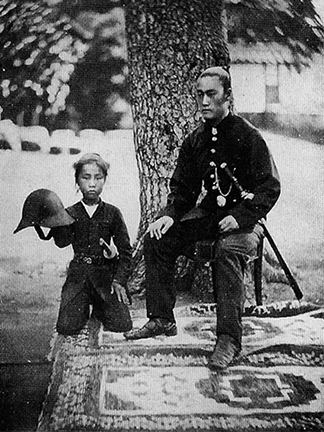
鍋島緞通が誕生したのは、今から三百五十年以上の前の江戸時代元禄年間。
シルクロードを通り、中国からこの佐賀の地へ鍋島緞通の技術が伝わりました。
その当時の様子が、明治十七年に建てられた佐賀県佐賀市扇町の苗運寺にある緞通碑には、「農業を営んでいた古賀清右衛門の家にかつて外国人より輩の織り方を習ったという使用人がおり、清右衛門が試みに織らせてみるとこれが美しく、自ら学んでその織り方を習得し、十二軒に織り方を伝授した。」と書かれています。
また、佐賀藩三代藩主鍋島綱茂候はその評判を聞きおよんでよろこび、扶持米を与えて技術を保護。
その後佐賀藩御用とされ、一般への売買が禁止されたと言われています。
江戸時代この敷物は「扇町紋氈」「花毛氈」と呼ばれていました。
当時より素材は木綿で、佐賀県白石の干拓地で栽培されていた上質の綿を使っていたと言われています。
明治時代になると鍋島緞通は一般への販売が開始され、「鍋島緞通」の名で華々しく宣伝されていきます。
明治六年にはウィーン万国博覧会にも出品されています。
また明治二十三年頃佐賀刑務所が出来、所長の吉島正敏や、藤戸精一の指導のもとで所内で更生事業として生産されていました。
大正時代には、吉島正敏商店(大正元年~)、原田商店(大正七年~昭和三十年)と鍋島緞通製造販売を家業とする商店が二軒出来、昭和十八年には商工省の丸技保存の認可を受けました。
それ以来、初代吉島正敏から二代目正清・義子を経て、現在では三代目を中心に四代目五代目とともに受け継がれてきた手織りの技術を一家継承いたしております。
Nabeshima Dantsu was created over 350 years ago in the Genroku era in the Edo period.
Passing along the Silk Road, the technique of Nabeshima Dantsu was brought to Saga from China.
A detailed description from that time written in a dantsu monument built in 1884 at Myouunji Temple in Ougimachi, Saga-shi, Saga Prefecture reads: “There used to be a servant in the residence of a farmer named Koga Seiemon, who learned how to weave from a person from abroad.
When Seiemon asked the servant to try to weave something, it was beautiful, so he learned that weaving method by himself, and gave instruction of that weaving method to 12 houses.”
Nabeshima Tsuneshige the third lord of the Saga domain, was delighted to hear of their reputation, and he protected the technique by providing a rice allowance. Later, it became a Saga domain business, and it is said that purchase and sales in general public was forbidden.
This rug was called the “Ougimachi Crest Rug,” or “Flower Pattern Rug” in the Edo period. The material has been cotton since that time.
It is said that quality cotton cultivated in the reclaimed land of Shiroishi, Saga Prefecture was used.
Sales of Nabeshima Dantsu to general public began in the Meiji period. It was splendidly advertised with the name: “Nabeshima Dantsu.”
It was also displayed for the Vienna International Exhibition in 1873.
The Saga Prison was built around 1890. Under the guidance of the director Yoshijima Masatoshi and Fujito Seiichi, the cotton rug was produced as a rehabilitation service in the prison.
In the Taisho period, Yoshijima Masatoshi Store (from 1912), and Harada Store (from 1918 to 1955), which conduct sales and manufacturing of Nabeshima Dantsu as family businesses were established.
In 1943, both stores received craft technology preservation approval from the Ministry of Commerce and Industry.
Since then, the handwoven technique was passed on from Yoshijima Masatoshi the First to the second generation Masakiyo and Yoshiko, and now the family-inherited practice centers around its the third generation along with fourth and fifth generation masters.
鍋島緞通の特徴Characteristics of Nabeshima Dantsu
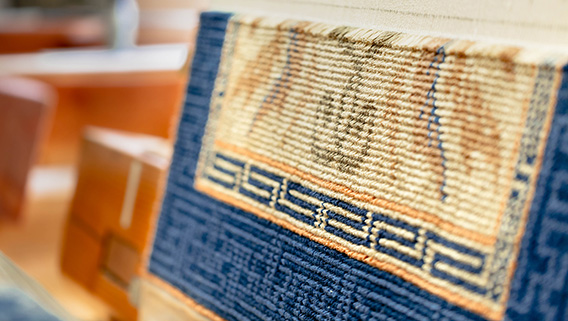
牡丹の多彩
緞通とは、毛氈(もうせん)を意味する中国語”毯子”(タンツ)が語源とされています。
日本的でありながら、ほのかに異国の香りを漂わせる洒落た柄行きはたどってきた長い道のりを思わせます。
なかでも絢爛と咲き誇る牡丹と、はさみを振り上げる蟹を招福と降魔を念じて意匠化した蟹牡丹(がにぼたん)は、鍋島緞通ならではの代表的な柄として様々に花開きました。Colorful Peony
The origin of “dantsu” is believed to be the Chinese word “Tǎnzi,” which means “rug.” While typically Japanese, its fashionable shape, color, and pattern with a faint exoticism suggests the long distance it has traveled.
Most importantly, the crab-peony design - showing a gorgeous peony in full bloom and a crab with its claws raised - is a prayer for bringing good luck and conquering the devil, blossoming diversely as a typical pattern distinctive of Nabeshima Dantsu.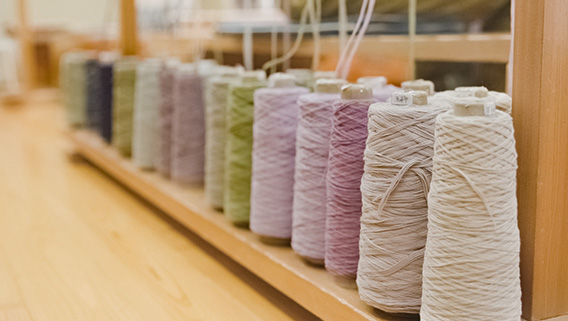
木綿の雅
冬は暖かく、夏爽やか、高温多湿の日本に適った鍋島緞通の素材は、経糸・緯糸・織込糸いずれも木綿です。
木綿は、手染めで仕上げており、虫食いも少なく、爽やかな風合いは時を重なるにつれ、味わいを増すのが鍋島緞通ならではの良さです。
大きさはたたみ一畳が基本で、その技法や素材、図案等は後の堺緞通や赤穗緞通などにも影響を与えたといわれています。Elegance of Cotton
The materials of Nabeshima Dantsu - warp yarn, weft yarn, and textile yarn - are all cotton, suitable for Japan with its warm winter, pleasant summer, high temperature and high humidity.
As cotton is finished with hand dyeing, and there are few wormholes. The quality of pleasant texture increases over time, which is a distinctive quality of Nabeshima Dantsu.
The size is basically one tatami mat. Technique, material, design, etc. are said to have had an impact later on Sakai Dantsu, Akou Dantsu, etc.
吉島伸一鍋島緞通株式会社YOSHIJIMA SHINICHI NABESHIMA DANTSU
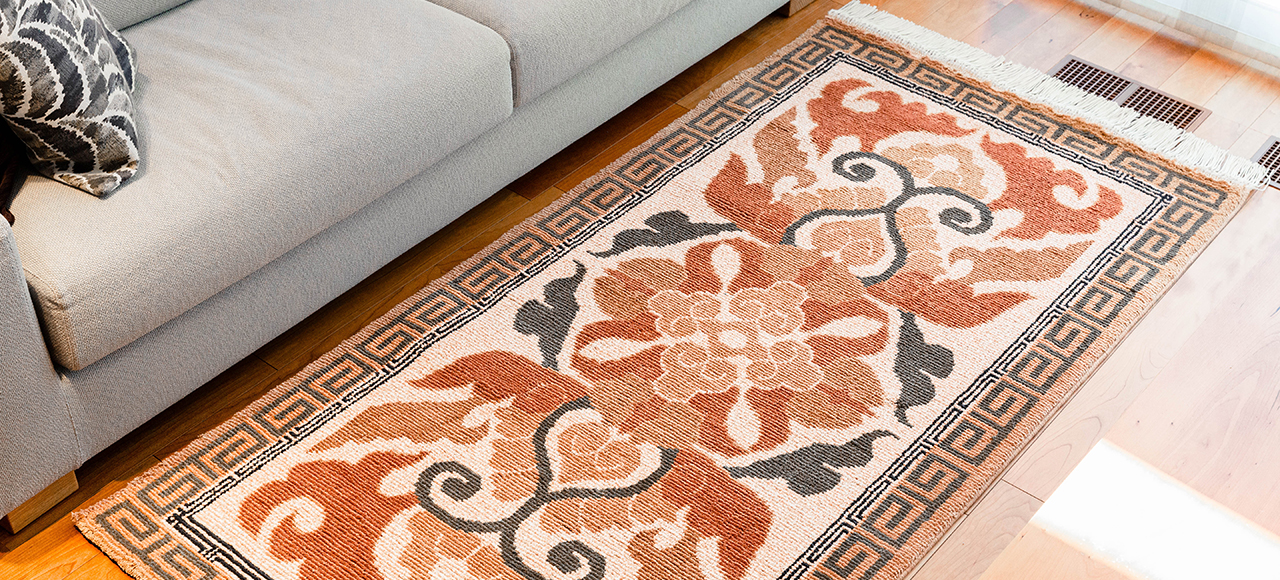
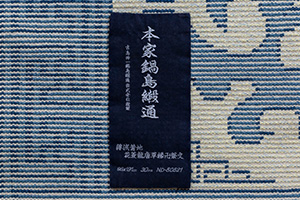
「本家鍋島緞通」は弊社吉島伸一鍋島緞通株式会社の登録商標です。(商標登録第6289214号)
弊社の作品に関しましては商品の裏のラベルに商標を表示いたしております。
“Honke Nabeshima Dantsu” is a registered trademark of Yoshijima Shinichi Nabeshima Dantsu Co., Ltd. (Registered Trademark No. 6289214). The trademark is displayed on the back of our products.
図案DESIGN
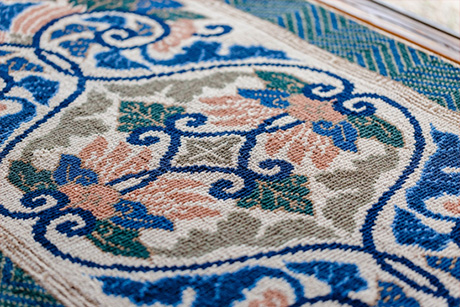
将軍家への献上品として生まれた代表柄
代表的な図柄の「蟹牡丹(がにぼたん)」を複雑化させて昇華させたものがこの献上蟹牡丹になります。
佐賀鍋島家の御用品として発展し、日本の格式と風情を象徴する図柄として、現在まで受け継がれております。
The typical pattern was created as an offering to the shogunate family.
A complicated and sublimated pattern of the typical pattern of “crab-peony” is this crab-peony for offering. It developed as a supply of the Saga Nabeshima family, and has been inherited to the present day as a pattern that represents Japanese formality and elegance.
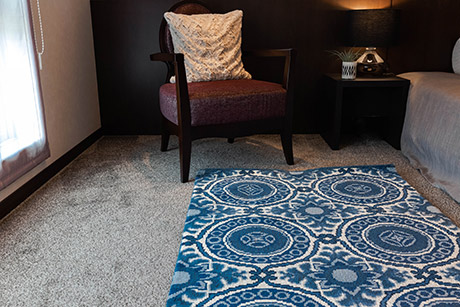
伝統と新しい生活様式の調和を目指した現代柄
「本家鍋島緞通」の作品は、伝統を重んじながらも時代に合わせた変化を取り入れています。
現代柄は、普段の暮らしの中で、鍋島緞通の深い魅力を身近に感じることができます。
オーダーメイドにもお応えしており、生活様式に合う小さめサイズも、手織りの長所を生かし細部までこだわって織り上げます。
タペストリー風インテリアなど、従来の枠にとらわれず、伝統技術の可能性を広げています。
Modern patterns that aim at harmonizing the tradition and new lifestyle
The products of “Honke Nabeshima Dantsu” adopt changes to match the times while valuing tradition.
The modern pattern conveys the deep attraction of Nabeshima Dantsu closely in everyday life.
We also take orders for custom-made products. Even for a smaller size that fits your lifestyle, we can utilize our advantage of hand weaving and weave in accordance with particular details.
We are widening possibilities of the traditional technique without convention, such as tapestry style interiors, etc.
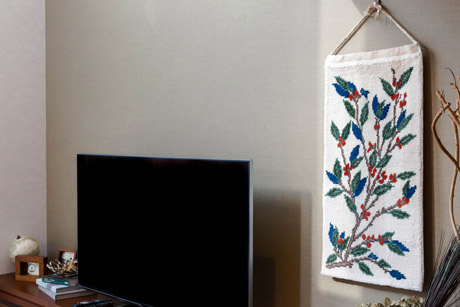
佐賀の伝統工芸の魅力をつなぐ
井上萬二先生、十四代今泉今右衛門先生、十五代酒井田柿右衛門先生をはじめとする、著名な先生方とのコラボレーションを実現しました。
染色家、陶芸家、日本画家のエッセンスを取り込んだコラボレーション作品は、それぞれの伝統技術が重なり合い、全く新しい価値を生みだしています。
Connecting with the traditional crafts of Saga
We have been working in collaboration with distinguished masters, including Master Inoue Manji, Master Imaizumi Imaemon the 14th, and Master Sakaida Kakiemon the 15th. The collaboration products incorporate the essences of dyeing professionals, ceramists, and Japanese painters, creating totally new value by overlapping each traditional technique.
染糸DYED YARN
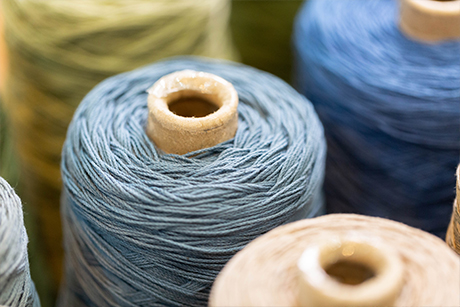
本家鍋島緞通で使用している木綿は、緞通に合った弊社オリジナルの耐久性とコシのある木綿です。
木綿を紡績で作り出し、いつまでも色褪せない特殊な染料を用いて、手染めで染め上げています。
弊社では、伝統色を極めつつ、新しい和の染色にも挑戦しています。
手染めの作業は、気温や湿度、時間などの条件が変わると色の表れ方が変わってしまうため、専門の職人の長年積み上げた経験をもとに作られます。
職人の手で染め上げた木綿は、何十年、何百年と変わらぬ風合いでお使いいただけます。
弊社オリジナルの色を用いながら、お客様のご要望に応じた作品作りを行っています。
Cotton used in Honke Nabeshima Dantsu is our company’s original cotton, with durability and flexibility necessary for rug. Cotton is spun into yarn, and dyeing is conducted by hand, using a special dye that doesn’t fade. At our company, we experiment with new Japanese dyeing while mastering traditional colors. As the appearance of color changes when the conditions, such as temperature, humidity, time, etc., change in the handwoven work, work is conducted based on the long-term experience of the craftsmen. Cotton dyed by the craftsmen can be used for decades to hundreds of years with unchanged texture. We create products to meet customer demands using the colors original to our company.
織りWEAVE
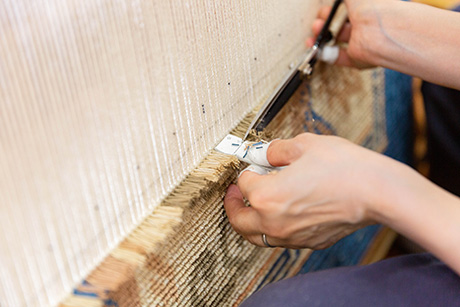
弊社は最も古い織元として、手織りの技術を一家で継承しています。
工房には毎日トントンという織り機の音が、数百年前と変わらず聞こえてきます。
代々継承されている手織りの技術で、一切機械を用いることなく、一人の職人が責任を持って仕上げており、一枚の作品に一目一目想いを込めながら丁寧にしっかりと織り上げます。
ひとつひとつを職人による手織りで仕上げられた本家鍋島緞通は、すべてが一点物になります。
手織りならではの柔らかな風合いと肌触りをぜひお試しください。
工房のご見学などお気軽にお問い合わせください。
As the oldest weavers, our company is the only manufacturer in which the handwoven technique is family-inherited. The same tapping sounds of weaving machines are heard every day at the workshop, as it was hundreds of years ago. The responsible craftsman carefully weave and finish while putting thought into each product at each glance with the handwoven technique inherited for generations. No machinated weaving is ever used. All of the products handwoven and finished by the craftsmen are one-of-a-kind products. Please try out the soft texture and feeling distinctive of hand-weaving. Feel free to contact us for visiting the workshop, etc.
継承者SUCCESSOR
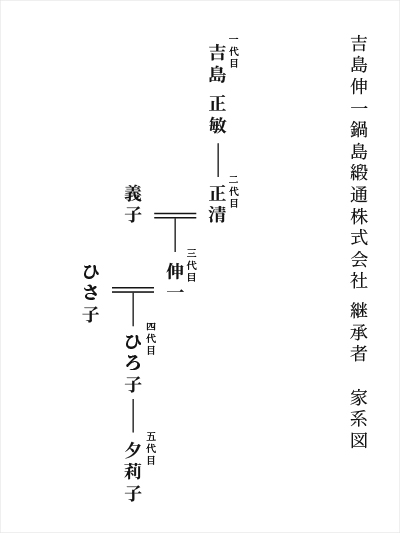
初代吉島正敏から続く代々の正統な後継者が織りの技術と伝統を途切れることなく一家継承し、先代たちの想いを織り込みながら未来へと織りつないでまいります。
Legitimate successors continued for generations from Yoshijima Masatoshi the First without interrupting the family-inherited weaving technique and tradition. We will weave into the future, weaving the spirit of our predecessors into our work.
【訃報】
弊社 代表取締役会長 吉島 伸一 儀 去る10月16日 80歳にて永眠いたしました。
故人は、昭和42年鍋島緞通創業家の三代目として仕事を始め、約55年にわたり鍋島緞通の存続と発展に尽くしてまいりました。
これもひとえに皆様のお力添えがあってのことと存じます。ここにあらためて生前のご厚誼に深謝申し上げます。
故人の鍋島緞通創業家としての強い思いを引き継ぎ、これからも「本家鍋島緞通」の商標のもと、一家継承にて
創業以来 111年続いている鍋島緞通の伝統を守り、織り繋いでいく所存でございます。
今後も変わらぬご指導ご鞭撻を賜りますようお願い申し上げます。
吉島伸一鍋島緞通株式会社
代表取締役社長 吉島ひさ子
代表取締役専務 吉島ひろ子
一代目 吉島 正敏The First Generation: Yoshijima Masatoshi
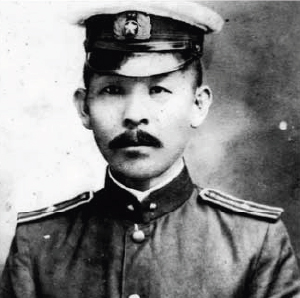
| 1867 | 1867年生まれ。
Born in 1867.
|
|---|---|
| 1912 明治45年 |
退官後、緞通織りを始め、大正元年4月1日に創業。 緞通袋に「鍋島緞通製造販売元 吉島正敏商店」と記載。 蟹牡丹の図案を改良し、弊社のロゴのモチーフとなった蟹牡丹文中心菱形をデザイン After retiring, he began cotton rug weaving, and founded the company on April 1, 1912. Described “Nabeshima Dantsu Manufacturing and Sales - Yoshijima Masatoshi Store” on cotton rug bags. He improved the design of crab-peony, and designed the ‘crab-peony pattern with diamond in the center’ that became a motif for our company logo.
|
| 1920 大正9年 |
勲八等瑞寶賞
The Order of the Sacred Treasure
|
|---|---|
| 1927 昭和2年 |
東亜勧業博覧会記念状
Commemorative Letter from the East Asia Industrial Exhibition
|
| 1928 昭和3年 |
阪神大博覧会 感謝状 御大典 奉祝 佐賀県勧業共進会 記念状 Letter of Appreciation from the Hanshin Grand Exposition
Commemorative Letter from the Saga Prefecture Industrial Exhibition for Celebrating the Enthronement |
| 1929 昭和4年 |
朝鮮博覧会 感謝状
Letter of Appreciation from the Chosen Exhibition
|
| 1931 昭和6年 |
商工省第18回工芸展覧会 3等賞受賞
Received the 3rd Prize for the 18th Crafts Exhibition Sponsored by the Ministry of Commerce and Industry
|
二代目 吉島 正清The Second Generation: Yoshijima Masakiyo
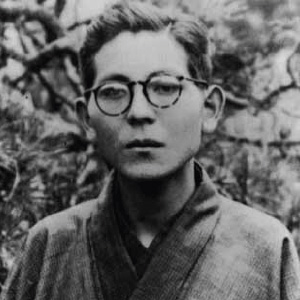
| 1912 | 1912年生まれ。
Born in 1912.
|
|---|---|
| 1929 昭和4年 |
中学卒業後家業を継ぐ
Inherited the family business after graduating from junior high school.
|
| 1935 昭和10年 |
第2回新製品競技展 3等賞 福岡日日新聞社主催 第3回西日本美術展覧会 入選 Received the 3rd Prize for the 2nd New Product Competition Exhibition
Selected for the 3rd West Japan Art Exhibition Sponsored by Fukuoka Nichinichi Shinbun |
|---|---|
| 1936 昭和11年 |
第1回工芸作品展覽会 褒賞
Received a Prize for the 1st Crafts Exhibition
|
| 1937 昭和12年 |
第4回九州沖縄各県連合 工芸試作品展覧会 特選
Specially Selected for the 4th Kyushu-Okinawa Prefectural Unit Crafts Prototype Exhibition
|
| 1939 昭和14年 |
第6回九州沖縄各県連合 輸出振興代用材利用工芸展覧会 特選
Specially Selected for the 6th Kyushu-Okinawa Prefectural Unit Crafts Exhibition for Utilizing Replacement Material for Export Promotion
|
| 1940 昭和15年 |
第2回貿易局工芸品輸出振興展覧会 褒賞 佐賀県工芸協会 作品輸出工芸品展覧会 3等賞 Received a Prize for the 2nd Trade Bureau Crafts Export Promotion Exhibition
Received the 3rd Prize for the Product Export Crafts Exhibition Sponsored by the Saga Prefecture Crafts Association |
| 1941 昭和16年 |
第8回九州沖縄各県連合 工芸試作品展覧会 推薦賞状
Received the Recommendation Award for the 8th Kyushu-Okinawa Prefectural Unit Crafts Prototype Exhibition
|
二代目妻 吉島 義子The Second Generation Wife: Yoshijima Yoshiko
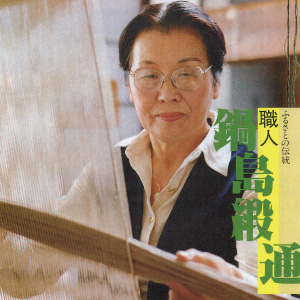
| 1915 | 1915年生まれ。
Born in 1915.
|
|---|---|
| 1938 昭和13年 |
吉島家に嫁ぎ、家業の緞通制作を手伝う。
Married to the Yoshijima family, and began helping the family business of cotton rug production.
|
| 1949 昭和24年 |
昭和天皇佐賀へ行幸
Emperor Showa makes an imperial visit to Saga.
|
| 1954 昭和29年 |
佐賀より久留米に移り聖園授産場を開設、聴力障害者に緞通の技術指導をする。
Moved to Kurume from Saga, opened the Misono Vocational Center, and conducted cotton rug technical guidance to deaf and mute people.
|
| 1946 昭和21年 |
新生九州産業展覧会
Newborn Kyushu Industrial Exhibition
|
|---|---|
| 1971 昭和46年 |
第20回久留米市総合美術展 特選
Specially Selected for the 20th Kurume-shi General Art Exhibition
|
| 1977 昭和52年 |
第12回西部工芸展 朝日新聞社銅賞
Received the Bronze Award for the 12th Western Crafts Exhibition Sponsored by the Asahi Shinbun-sha
|
| 1985 昭和60年 |
伝統的工芸品産業功労者、久留米市技能功労者として表彰
Awarded as a Person of Merit for the Traditional Crafts Industry, and Skilled Person of Merit for Kurume-shi
|
三代目 吉島 伸一・ひさ子 The Third Generation: Yoshijima Shinichi and Hisako
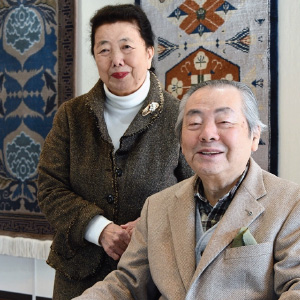
| 1941 | 伸一 1941年生まれ
Shinichi was born in 1941.
|
|---|---|
| 1944 | 妻ひさ子 1944年生まれ
Hisako was born in 1944.
|
| 1967 昭和42年 |
伸一と妻ひさ子と母義子が久留米にて事業再開、有限会社吉島敷物を設立
Shinichi, his wife Hisako, and his mother Yoshiko re-started the business in Kurume, and established Yoshijima Rug, Ltd.
|
| 1974 昭和49年 |
フックドラグの生産を開始
Began producing hooked rugs
|
| 2006 平成18年 |
北京故宮博物院 第一回目契約
Signed a first contract with the Palace Museum in Beijing City
|
| 有限会社鍋島緞通吉島家設立 (平成22年1月20日に有限会社から株式会社へ移行) Established Nabeshima Dantsu Yoshijima Family, Ltd. (changed from limited company to stock company in January 20, 2010)
|
|
| 佐賀市赤松町に鍋島緞通吉島家ミュージアムオープン
Opened the Yoshijima Family Dantsu Museum in Akamatsucho, Saga-shi
|
|
| 中国寧夏回族自治区へ第一回目の中国緞通視察
Made the first Chinese cotton rug observation tour in the Ningxia Hui Autonomous Region in China
|
|
| 2007 平成19年 |
中国寧夏回族自治区へ第二回目の中国緞通視察
Made the second Chinese cotton rug observation tour in the Ningxia Hui Autonomous Region in China
|
| 2009 平成21年 |
第五回北京故宮博物院展を吉島家緞通ミュージアムにて開催
Opened the 5th Palace Museum in Beijing City Exhibition at the Yoshijima Family Dantsu Museum
|
| 2010 平成22年 |
創業100周年記念 中国北京故宮博物院の緞通と日本の緞通展を佐賀県立美術館にて開催
Opened the “Exhibition on Dantsu of the Palace Museum in Beijing City and Dantsu in Japan” at the Saga Prefectural Art Museum as the centennial anniversary of our foundation
|
| 2012 平成24年 |
鍋島緞通吉島家を退社
Left Nabeshima Dantsu Yoshijima Family
|
| 鍋島緞通の伝統の技術を一家継承していくために吉島伸一鍋島緞通株式会社を設立 新たに長女吉島ひろ子を四代目技術継承者に任命 Established Yoshijima Shinichi Nabeshima Dantsu Co., Ltd. To continue the tradition of the Nabeshima Dantsu family inheritance
Newly appointed the eldest daughter Yoshijima Hiroko as the fourth generation technique successor |
|
| 2018 平成30年 |
創業107周年記念 日本の至宝後世に伝えたい鍋島緞通展 開催
Opened the ‘Japanese Treasure: We Want to Tell Future Generations About Nabeshima Dantsu’ Exhibit as the 107th anniversary of our foundation
|
| 1981 昭和56年 |
福岡県特産工芸品指定
Designated as a Special Craft Product of Fukuoka Prefecture
|
|---|---|
| 1982 昭和57年 |
第6回全国伝統工芸品展 通商産業省生活産業局長賞
Received the METI Consumer Goods Industries Bureau Director Award for the 6th National Traditional Crafts Exhibition
|
| 1996 平成8年 |
第20回全国伝統的工芸展 商工中金理事長賞
Received the Shoko Chukin Bank Chairman Award for the 20th National Traditional Crafts Exhibition
|
| 2001 平成13年 |
第21回伝統文化ポーラ賞受賞
Received the 21st Traditional Culture Pola Award
|
| 2016 平成28年 |
佐賀県伝統的地場産品指定
Designated as a Traditional Local Product of Saga Prefecture.
|
四代目 吉島 ひろ子The Fourth Generation: Yoshijima Hiroko
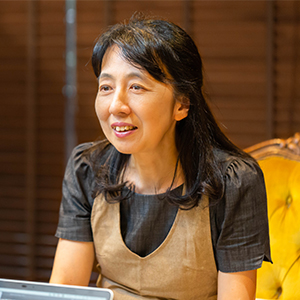
| 1967 | 1967年生まれ。
Born in 1967.
|
|---|---|
| 2012 平成24年 |
四代目技術継承者を就任
Appointed as the fourth generation technique successor
|
| 2020 令和2年 |
佐賀の文化と伝統を世界に向けて発信する佐賀ブランド【SAGA COLLECTIVE】 参加
Joined the Saga brand [SAGA COLLECTIVE] to deliver Saga culture and traditions to the world
|
| 2015 平成27年 |
第50回記念西部伝統工芸展 初入選
Selected for the 50th Anniversary Western Traditional Crafts Exhibit for the First Time
|
|---|---|
| 2016 平成28年 |
全国伝統的工芸品公募展特別賞
Received the Special Prize for the National Traditional Crafts Public Exhibition
|
| 2019 令和元年 |
中国北京にて開催された日本伝統工芸展出品 第3回三井ゴールデン匠賞 ファイナリスト選出 Displayed in the Japan Traditional Kógei Exhibition in Beijing, China
Selected as a Finalist and Received the 3rd Mitsui Golden Artisan Award |
五代目 吉島 タ莉子The Fifth Generation: Yoshijima Yuriko
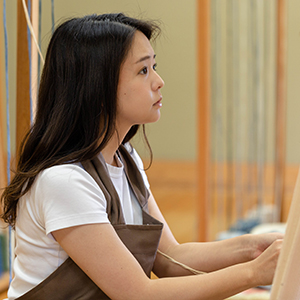
| 1991 | 1991年生まれ。
Born in 1991.
|
|---|---|
| 2014 平成26年 |
聖心女子大学卒業
Graduated from University of the Sacred Heart, Tokyo
|
| 2016 平成28年 |
女子美術大学短期大学部造形学科 デザインコーステキスタイル卒業 卒業後、大手人材広告会社に就職 Graduated from Joshibi University of Art and Design Junior College (Design Course in Textiles, Department of Art and Design)
Worked for a major HR advertising company after graduation |
| 2019 平成31年 |
五代目技術継承者として入社
Joined the company as the fifth generation technique successor
|
| 2020 令和2年 |
伝統工芸を守りつなぐ3人の女性後継者ブランド【 襷 TASUKI 】 立ち上げ
Launched the 3 women successor brand [TASUKI] that protects and connects traditional crafts
|
| NHK放送番組審議会委員に就任
Appointed as a Member to the NHK Broadcast Program Council Committee
|
|
| TAKUMI NEXT 2020選出
Selected for TAKUMI NEXT 2020
|
祖母や母から、歴史ある弊社本家鍋島緞通ならではの色やデザインの感覚や感性を引き継ぎながらも、後世に代々敷き継がれる新しい作品を創り続けていけるよう日々精進してまいります。
I do my best to continue creating new products that will be inherited by future generations while continuing with the color and design specific to Honke Nabeshima Dantsu, with the history of my mother and grandmother.
作品紹介PRODUCT INTRODUCTION
古典柄、現代柄、著名な先生方とのコラボレーションなど、
弊社独自の色を用いながらお客様のご要望に応じた1枚1枚の作品作りを行っています。
From classic patterns to modern patterns and collaboration with distinguished masters, etc., we create each product to meet customer demands using the color original to our company.
幼い頃より工房を遊び場として育ち、自然と織りの技術を身に付けました。
現在は4代目技術継承者として守るべき伝統を大切にしつつも、自分らしい新しい作風を取り入れ、工芸展などへの出品を行っています。
From childhood, I grew up with the workshop as a playground, and naturally acquired the weaving technique.
Currently, I absorb new styles of work in my own way, and display for exhibitions, etc., while valuing the tradition that must be protected as the fourth generation technique successor.